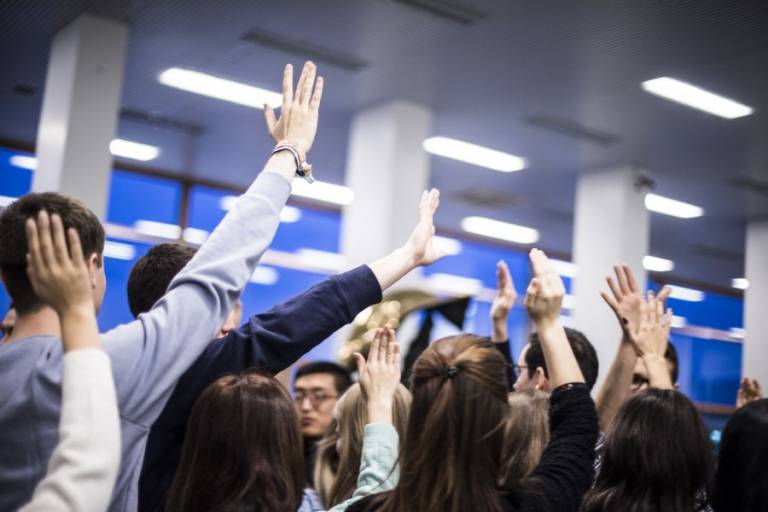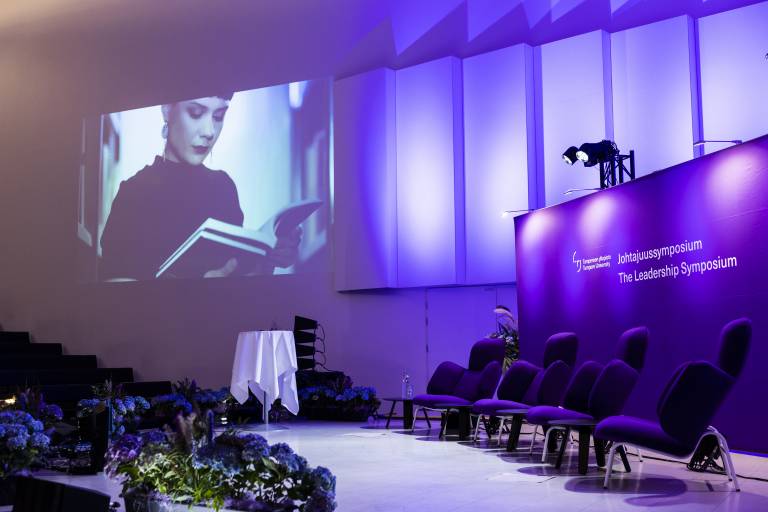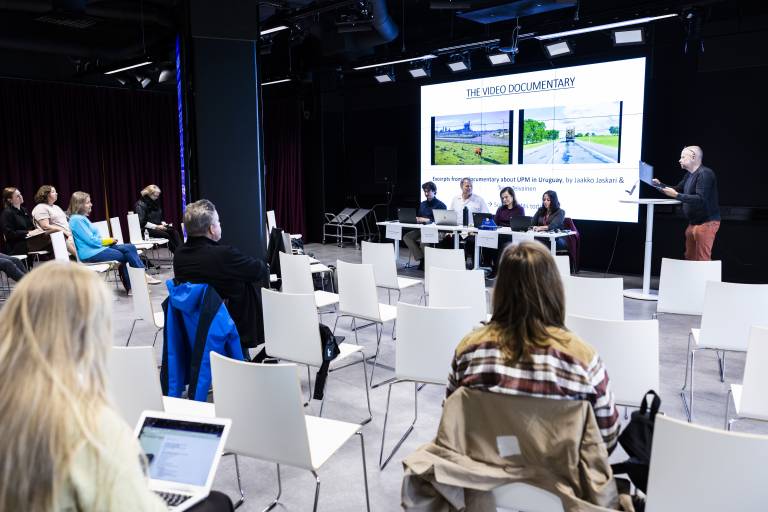Lea Rankinen, currently the director in sustainability and public affairs at Paulig Group, brings with her remarkable 20 years of unique expertise gained within the food, retail and service businesses. Previously to joining Paulig Group, she occupied the role of SVP in Sustainability at S Group from years 2013–2019. Besides her successful career in corporate responsibility, sustainability and business development, Lea Rankinen is also an active member of various Finnish and EU-level organizations. She is a co-chair of board of directors at the sustainable trade community amfori, a board member of corporate responsibility network FIBS, and a member of the Finnish Human Rights Delegation. For her outstanding work in sustainability, Lea Rankinen has been awarded by the Fairforce 100 Green Board Members in 2020, as well as ranked number 13 at the Top 20 Responsibility Leaders in Northern Europe in 2017.
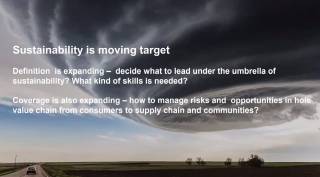 “Sustainability is always a moving target” Lea Rankinen reminded us of the dynamic nature of sustainability, due to the many topics and constantly developing technologies that need to be taken into perspective. When it comes to leadership in sustainability, her success formula emphasizes the importance of determining all dimensions that are to be included into the company’s umbrella of sustainability. “You can’t do everything”, she added. Once the focus areas have been scoped out, it becomes the leaders’ responsibility to identify the skillset needed for successful execution, the competence they currently have onboard and the possible organizational structure changes that support future strategic alliances. Rankinen raised the utmost importance overseeing the entire supply chain in managing sustainability. “Nowadays it is not enough anymore that you are looking at your own operations, and managing the environmental issues there”, she noted. Companies need to extend their strategic goals to various business partners, suppliers, involving even consumers and communities.
“Sustainability is always a moving target” Lea Rankinen reminded us of the dynamic nature of sustainability, due to the many topics and constantly developing technologies that need to be taken into perspective. When it comes to leadership in sustainability, her success formula emphasizes the importance of determining all dimensions that are to be included into the company’s umbrella of sustainability. “You can’t do everything”, she added. Once the focus areas have been scoped out, it becomes the leaders’ responsibility to identify the skillset needed for successful execution, the competence they currently have onboard and the possible organizational structure changes that support future strategic alliances. Rankinen raised the utmost importance overseeing the entire supply chain in managing sustainability. “Nowadays it is not enough anymore that you are looking at your own operations, and managing the environmental issues there”, she noted. Companies need to extend their strategic goals to various business partners, suppliers, involving even consumers and communities.
Sustainability, the Paulig way
Joining the Paulig Group, a family-owned business with 145 years’ history of operating in the food and beverage industry, Lea Rankinen focused on embracing the innovative development and renewal achieved throughout the years, as well as understanding the organizational culture. She aimed to identify the strengths to build strategic advantage upon and scope the areas that require critical development and improvement. She found it pleasing to notice the crucial role a strong heritage and identity played in dictating sustainable development and the outlook towards preserving it for future generations. Lea Rankinen had a clear ambition coming onboard as she aimed to challenge the strong renewal culture by integrating the core sustainability targets within the business strategy.
It was intriguing to learn that Paulig Group is very value-driven and inclusive, when it comes to collaboration. With the Group’s 100% plant-based product portfolio, “it is quite future-fit” and “driving the sustainable future of food”, Lea Rankinen commented. It surely creates certain competitive advantages within the food and beverage industry. However, when it comes to risk management, Lea Rankinen highlighted the importance of integration to strategy in order to manage the ambition level and to create impact through concrete actions. “Sustainability is in our DNA”, she said, which is why Paulig’s sustainability team puts a lot of effort into identifying the initiatives, which have the biggest potential to bring impactful change and by focusing internal resources into increasing transparency across the entire value chain.
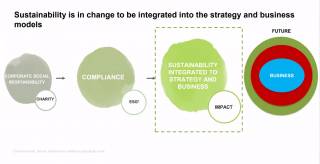 During the lecture, we learnt that leading sustainability starts with making decisions on the most impactful focus areas and further defining what CSR means on a company level, as well as additional aspects to be considered under the ‘umbrella of sustainability’. In addition, companies need to be constantly aware of the legislative compliance as well as of new policies that are being framed, and guidelines that require corporate governance. The third stage represents the framing of sustainability leadership, how to manage target setting and ambitions. Speaking from her own vast experience, Lea Rankinen noted that “sustainability is a big change and needs to be integrated in the strategy” as an operational and risk management issue. The fourth wave of sustainability leadership represents a more theoretical structure, looking at the social science and environmental actions on a more ambitious level. When it comes to the future outlooks for sustainability, Rankinen discussed the role of businesses to be “in the core, and it needs to build to the sustainability leadership [by] acting in planetary boundaries and taking into account the people.”
During the lecture, we learnt that leading sustainability starts with making decisions on the most impactful focus areas and further defining what CSR means on a company level, as well as additional aspects to be considered under the ‘umbrella of sustainability’. In addition, companies need to be constantly aware of the legislative compliance as well as of new policies that are being framed, and guidelines that require corporate governance. The third stage represents the framing of sustainability leadership, how to manage target setting and ambitions. Speaking from her own vast experience, Lea Rankinen noted that “sustainability is a big change and needs to be integrated in the strategy” as an operational and risk management issue. The fourth wave of sustainability leadership represents a more theoretical structure, looking at the social science and environmental actions on a more ambitious level. When it comes to the future outlooks for sustainability, Rankinen discussed the role of businesses to be “in the core, and it needs to build to the sustainability leadership [by] acting in planetary boundaries and taking into account the people.”
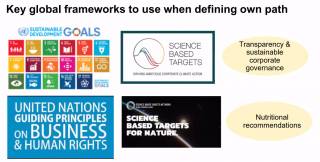 In defining a corporation’s own path, it is also important to consider the existing key global frameworks and approaches towards sustainability development and implementation, keeping in mind which of them can serve as guiding principles to deliver the most critical impacts on the environment, climate, and human rights. As a company operating in the food sector, it is also crucial to raise awareness on the nutritional recommendations and benefits for consumers. “There is all the time increasing demand for transparency and increased governance”, adds Lea Rankinen.
In defining a corporation’s own path, it is also important to consider the existing key global frameworks and approaches towards sustainability development and implementation, keeping in mind which of them can serve as guiding principles to deliver the most critical impacts on the environment, climate, and human rights. As a company operating in the food sector, it is also crucial to raise awareness on the nutritional recommendations and benefits for consumers. “There is all the time increasing demand for transparency and increased governance”, adds Lea Rankinen.
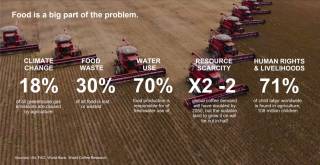 “If you think about the risks and planetary boundaries and human rights issues, we can definitely state that food is a big part of the problems and challenges”, Rankinen notes. Agriculture is tightly linked to climate change, contributing to resource scarcity and involvement in human rights violations, such as child labor. Lea Rankinen discussed these problem areas and identified them as critical within the food industry. “These are the key facts we need to take into account when developing risk management [and which] every company should integrate into their operations and mitigate as highly as possible”, she says.
“If you think about the risks and planetary boundaries and human rights issues, we can definitely state that food is a big part of the problems and challenges”, Rankinen notes. Agriculture is tightly linked to climate change, contributing to resource scarcity and involvement in human rights violations, such as child labor. Lea Rankinen discussed these problem areas and identified them as critical within the food industry. “These are the key facts we need to take into account when developing risk management [and which] every company should integrate into their operations and mitigate as highly as possible”, she says.
Global statistics have also been increasingly challenging with health and wellbeing of people, and planet being under a threat. Consumers are also playing a crucial role in demanding awareness and raising concerns about societal purchasing choices. “Especially millennials are saying they will buy a product because it is associated with a cause“, Rankinen elaborates on the demands from the consumer point of view.
At the same time, Lea Rankinen recognizes that “food can also be a big part of the solution […] and that is how we can translate those challenges as opportunities”. By aiming to guide the changes that are needed within the value chain, Paulig Group targets to increase the delivery of products that are both “good for the people, good for the planet”.
Framework for success
We had the privilege to learn from Lea Rankinen’s clever framework for leading sustainability, which highlights the key success factors for enabling sustainable development and implementation. Rankinen walked us through how each of the steps have been interpreted into Paulig Group’s strategy.
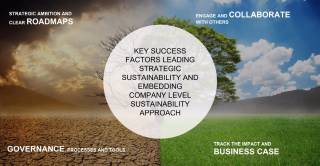 The process begins with identifying the company’s own strategic ambitions and roadmaps, based on data and analysis from the external world. At Paulig Group, this translates into setting the long-term goal to become a sustainable frontrunner among the food & beverage companies by 2030.
The process begins with identifying the company’s own strategic ambitions and roadmaps, based on data and analysis from the external world. At Paulig Group, this translates into setting the long-term goal to become a sustainable frontrunner among the food & beverage companies by 2030.
Within Paulig Group, the role of the sustainability team is viewed as an actor for guiding change. “As our ambition is to be the frontrunner, then my role is to lead this strategic development, frame it, make it credible, create the roadmaps to achieve the status of sustainability frontrunner”, Lea Rankinen added.
Within this step, the focus shifts onto the ambition areas and aims to concretize the core actions, crucial for achieving the targeted strategic objectives. In Paulig’s case, three ambitious focus points stand out, which translates three of the key SDG goals into corporate objectives. Paulig’s climate GHG emission targets have additionally been validated through the Science Based Targets initiative. “Our [SBT] ambitions were the most ambitious in the whole world”, Lea Rankinen concludes with pride.
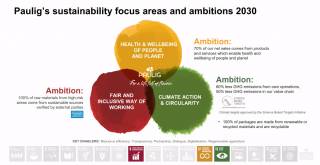
Having defined the longer-term sustainability targets, Lea Rankinen reminds us how important it is to break these down into shorter-team goals, which end up guiding the strategic outlook for the next few years. “This is helping internally to show that we are not biting the elephant as a whole, but we are taking few-years steps”, Lea Rankinen commented on the importance of identifying ‘quick wins’ to start to deliver the strategy, and only then proceeding towards scaling and ramping up actions, while tackling the ongoing developments within governance and sustainability reporting. “Roadmaps are really the key, they guide the way to reach these [sustainability] ambitions, so short term initiatives and targets are really, really important”, she noted.
In planning principles and deciding on the initiatives for action, it is essential to view these actions from the impact side and focus on the ones, where resources and efforts are minimal, but the results have a high pro-environmental impact. When it comes to actions, it is also vital to keep an ongoing discussion with internal functions, in order to promote internal understanding and transparency.
With 97% of CO2 emissions coming from the value chain, and only 3% tracked to Paulig’s own operations, it became clear that raw materials are inevitably the main contributor. The two biggest categories, coffee and tortillas compiled 50% of the entire value chain emissions. This made the scoping of critical focus area rather straightforward, due to its potential for highest possible impact of emissions reductions. At the same time, balancing an extensive value chain is not a simple task. With its 660 suppliers, located across 80 countries, Paulig’s goal focused on collecting data-based insight, building traceability in the supply chain and improving risks management in all its areas.
Even within its biggest focus area, which is coffee, Paulig has already achieved transparency in the supply chain and today, 100% of raw coffee beans are traced to externally verified sustainable sources. However, this excellent performance is not enough for Lea Rankinen’s sustainability vision. “Here our strategy is to keep the level, but next […] is to start to build on the more comprehensive climate work”, she says.
In practice, managing and leading sustainability is essentially about building bridges and networking internally as well as externally in order to create strong partnerships in all areas, where more in-depth specialized expertise is needed. This is why collaboration and engagement with various partners occupies the second place in Lea Rankinen’s framework for key success factors. The third phase of the Sustainable leadership framework focuses on the governance, as well as determining the processes and tools, which can provide the utmost support in achieving the set objectives. The final step of the framework consists of creating measures, such as KPIs, and establish accountability in tracking the strategy implementation progress throughout the year, as well as develop the business case as needed.
Taste the change: Strategic Sustainability Initiatives 2022–2024
Paulig Group commits to four main areas, when it comes to their business strategy: (1) Carbon reductions – coffee and tortillas, (2) Carbon neutrality in own operations, (3) Recyclable packaging and (4) Sustainable sourcing of spices. “We have a very strong alignment at the company level for these initiatives”, Lea Rankinen commented, acknowledging that excellent progress has been made in guiding governance and aligning day-to-day operative initiatives through strategy implementation.
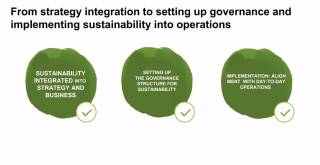 Alignment is also ensured through the Sustainability Management Group, who lead the target setting, overlook the reporting processes, and ensure accountability across operations.
Alignment is also ensured through the Sustainability Management Group, who lead the target setting, overlook the reporting processes, and ensure accountability across operations.
The four strategic initiatives provide a clear and shorter-term focus into strategy execution. Tracking the progress on the level of each of the four core areas, helps in validating the targets and their impact on the corporate culture. Collaboration is a key element, contributing to the successful implementation of the key factors model, while cross-departmental cooperation drives proactive discussion and innovativeness at Paulig. A great example supporting that is the impressive achievement of carbon neutrality at 6 out of the total 10 production sites at Paulig Group. Another pro-climate change accomplishment has been the decision to source wheat flour more locally within Scandinavia in order to pursue a 30% reduction in emissions, optimizing the environmental impact of Santa Maria’s tortilla brand. Additionally, the Paulig Group is committed to absolutely eliminate the usage of non-recyclable materials in their packaging, and currently 86% of all packages are recyclable. The final focus area, which is spices, is on track to achieving 100% sustainable sourcing practices, whereas the measure is currently at 30% for the top three spices in terms of purchasing volumes: black pepper, chili, and onion.
The collaboration possibilities are endless
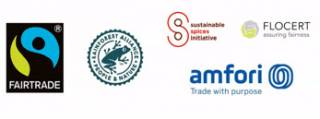 In addition to encouraging internal collaborations, Paulig Group also actively engages in global collaborations in mandating for law development and innovativeness of more sustainable food produce.
In addition to encouraging internal collaborations, Paulig Group also actively engages in global collaborations in mandating for law development and innovativeness of more sustainable food produce.
Human rights are a key value for Lea Rankinen: “We are also doing broader collaboration with different platforms globally and together with other companies advocating for more legislation. Every company should do their due diligence on the human rights risks”, she concludes.
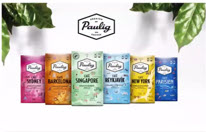 Paulig also launched a successful collaboration with customers in 2021. The city-themed coffees aimed at connecting consumers in the areas of new plantation placements, while increasing the visibility of the local farmers’ stories.
Paulig also launched a successful collaboration with customers in 2021. The city-themed coffees aimed at connecting consumers in the areas of new plantation placements, while increasing the visibility of the local farmers’ stories.
Managing food loss is an important aspect of achieving optimization within the supply chain, which is why together with the Helsinki University, Paulig Group supported the need for bringing transparency in the beginning of the supply chain through extensive research cooperation.
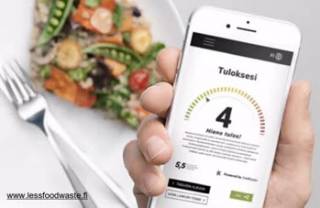 The company also engages in challenging their consumers. A great example was the collaboration with Luke and launch of the Less food waste calculator app, raising awareness of consumer behavior and aiming to minimize the impact of food loss in domestic households.
The company also engages in challenging their consumers. A great example was the collaboration with Luke and launch of the Less food waste calculator app, raising awareness of consumer behavior and aiming to minimize the impact of food loss in domestic households.
By cooperating with external partners, Paulig is also taking responsibility towards cutting GHG emissions in Scandinavian harbors by up to 90%.
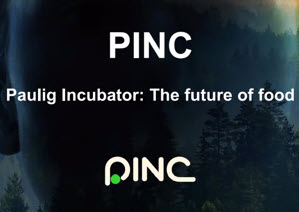 Finally, Paulig holds a lot of hope for their future investments in their PINC portfolio, and their attempts towards upcycling of coffee waste as a raw material in cosmetics and looking for future options in the food business to promote healthiness and more sustainable food behavior of consumers. “My role is to look at delivering the strategy and how we change the current business and current portfolio”, Lea Rankinen comments on her involvement in future food innovativeness.
Finally, Paulig holds a lot of hope for their future investments in their PINC portfolio, and their attempts towards upcycling of coffee waste as a raw material in cosmetics and looking for future options in the food business to promote healthiness and more sustainable food behavior of consumers. “My role is to look at delivering the strategy and how we change the current business and current portfolio”, Lea Rankinen comments on her involvement in future food innovativeness.
We are extremely thankful to Lea Rankinen for sharing her insightful knowledge and expertise about leading sustainability and further inspiring us to pursue sustainability within our studies and future career developments.
The LFC Lecture with Lea Rankinen was organized and hosted by the Leadership for Change students Chloe Horton, Dilyana Kääriäinen, Eetu Kekkonen, Joel Popov, Karoliina Rautavirta, Sini Santikko and Ralf Friman.


